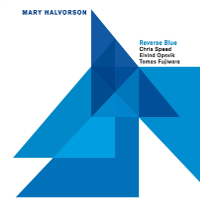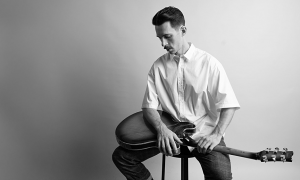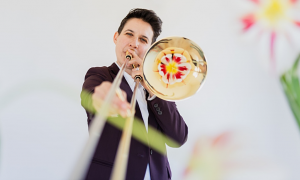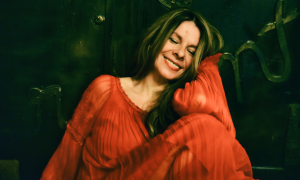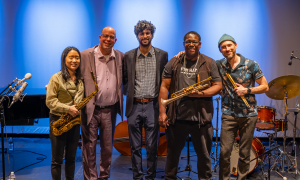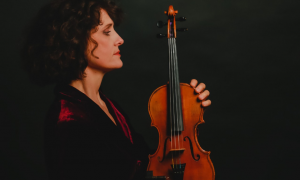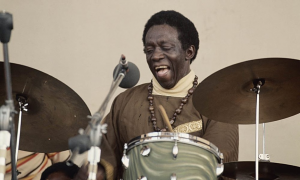Home » Jazz Articles » Take Five With... » Take Five With Mike Pope
Take Five With Mike Pope

Meet Mike Pope:
Mike Pope is a virtuoso acoustic and electric bassist who has toured extensively with Chick Corea, David Sanborn, Al Di Meola and Bill Bruford, and more recently, Joe Locke and Eldar Djangirov. Raised in Ohio by two parents who were both classical musicians and educated at the University of North Texas, Pope came under the influence of legendary saxophonist Michael Brecker and eventually played with him in New York City, as well as with Blood Sweat and Tears, The Gil Evans Orchestra, Manhattan Transfer, and many other jazz stars. Pope has recorded three albums, with artists such as Michael Brecker, Randy Brecker, John Patitucci, and Jeff Tain Watts. As John Patitucci writes, "Mike Pope is a real Renaissance man. He is a musician of broad scope and tremendous talent. His virtuosity on electric and acoustic bass is rare even by today's standards." Mike Pope's touring band, the House of Cardinals, includes four phenomenal musicians: vibraphonist Joe Locke, Brazilian drummer Mauricio Zottarelli, Russian pianist Eldar Djangirov, and tenor saxophonist Bob Franceschini. In 2014, the group played Blues Alley in Washington, D.C., An die Musik Live in Baltimore, and Regattabar in Cambridge.Instrument(s):
Acoustic and Electric Bass. I have a mid-1960s Pollman Acoustic bass, and I've been with Fodera for electric basses for years, now. I play the Mike Pope signature model, the Viceroy.Teachers and/or influences?
I think almost every bassist influences me. If a bassist is making music, I feel it. My first teacher was Jeff Halsey, an amazing bassist who lives in Bowling Green, Ohio, where I grew up. He taught me how to be a BASS player" and what it meant to swing and to support a band.At the University of Northern Texas, I studied classical bass with Ed Rainbow, with less than stellar results. Thus, I am once AGAIN studying classical bass, this time with Victor Dvoskin at Towson University where I'm aiming for a master's degree. So I'll finally officially be a master :-)
Over the years, John Patitucci has been a great friend, mentor, and teacher. It became evident to me that in order to achieve mastery, I needed some skills that I could learn only from studying the classical repertoire. Having to repeatedly play the same thing the same way fosters growth in areas outside your comfort zone.
I knew I wanted to be a musician when...
I was born :-) Music has been a daily means of communication among my family members as long as I can remember. It was natural. Never forced or expected. It was just THERE.Your sound and approach to music:
I typically go for as loud and fast as possible. :-) When that doesn't work, I generally go with sincerity. Seriously, though, for me it's all about being real. I want the music I play and write to be honest, to be a reflection of something inside me, and not a construct. That can be difficult when composing, because writing music is generally not a real-time process. Very often, technique and procedure cloud the musical picture. The same can happen when playing. I hear so many great bass players and piano players (the two instruments I can play well enough to be expressive) who play with so much facility and have so much to say and say it so succinctly that it becomes easy to focus on HOW to play. But with music, the "what" comes first, and the "how" comes second. We are results-oriented creatures, like it or not, and the best results start with the best intentions.Your teaching approach:
I would refer you to the answer to the previous question. Teaching technique is obviously important insofar as it facilitates musicians' ability to develop an interface between their musical mind and the part of them that actually does the playing: the body (or really the motor nervous system).But SO often I've had students come to me to learn how to improvise or play jazz, and when I ask them what they like, they reply that they don't really like jazz, don't really listen to it, and don't really know what they want to be able to do, except that they heard me or someone else play and thought, "that's pretty cool. I wanna be able to do that." Music is nothing without inspiration, at least from my perspective. I try to inspire by exposing my students to music that might inspire them. But there's "inspired" in the immediate sense, and "inspired" in a general sense. I believe the former is affected by the teacher, but the latter is either there or it isn't. It's an inherent state of mind. I've also learned that great teachers really put time and energy into teaching. They truly WANT to see their students' lives changed.
Your dream band:
I can't say that I can envision an "ideal" band. There are musicians with whom I've always wanted to play, and many with whom I HAVE played and hope to continue to play. I'm fortunate enough to get to play with my favorite musicians all the time.But one ideal band is the musicians who played with me on the release of my CD, Cold Truth, Warm Heart in June of 2014. Vibraphonist Joe Locke is one of my favorite musicians, period. It's just unbelievable how hard he swings and how fluidly he gets around changes. And his concept as a leader and writer is equally daunting. Pianist Eldar Djangirov is flat-out scary. I wonder what it's like to just be able to play anything at any tempo whenever you choose and THEN wake up and get out of bed! Saxophonist Bobby Franceschini is such a swinging badass with such an enormous vocabulary that I learn every time I hear him. And drummer Mauricio Zotarelli has this time feel that is strong and melodic at the same time, with huge ears and an ability to make complex music sound simple and vice versa. Plus, they are all beautiful people with whom I like hanging out. (The bassist's a drag, though :-)
I've always wanted to play with guitarist Pat Metheny. We know each other a little, but an opportunity to play together has never arisen. Pianist Herbie Hancock is another guy I've dreamt of playing with, but I've never even met him.
I wish I could have played more often with Mike Brecker. It was SO sad when he passed. I pulled out my first CD, The Lay of the Land, and had a day of mourning for him. Great memories. On the second recording session, as we were all warming up and getting sounds, Michael started playing "Moment's Notice," so we all joined in. And he played his ASS off!!! But imagine this: the engineer didn't hit "record." Oh, man, was I disappointed!
There are so many young musicians around now who are inspiring and turning heads. I hope I don't get too over the hill to get a chance to play with some of them.
Road story: Your best or worst experience:
No whining? No Comment! Kidding! While I was on a tour in Italy with Joe Locke, Henry Hey, and Tim Horner, Henry started doing this strange impression of a goat, where he would turn his profile to you, grab his lips and pull them away from his gums, and stick his tongue out slightly—all the while, looking at you out of the corner of his eye. It was strange, but frickin' hilarious to see. He still has a thing for goats"¦regularly hijacking the Facebook page of Mike League (the bassist/leader of Snarky Puppy) and replacing his profile pic with that of a goat. He's a really funny guy!Anyway, so we'd been hanging out at a friend's house in Rome for a few days before our first Italian date in Terni. We'd been goofing off and having fun, and all of us constantly "goating" at one another. When we arrive in Terni, Joe casually said something to the effect of, "All right, cats. Enough of this goat shit. There's press here taking pictures, so let's stay composed." Then following the concert, Joe was asked to do an interview. He takes interviews pretty seriously, and this one was on camera. While waiting for him to finish, Henry, Tim, and I walked to the opposite corner of the hall near the exit. From our far-away vantage point, we were unable to hear what he was saying, but at one point we saw him put up his finger in a "one second, please" gesture. He then proceeded to turn his head sideways to the camera and interviewer and did the "GOAT" face on film! We all nearly died laughing. It was only the first gig, so I guess nothing else memorable had happened yet!
Favorite venue:
The one venue that really sticks out in my mind is the Sydney Opera House, where I played with The Manhattan Transfer. It was an orchestra gig, meaning we were playing larger-scale arrangements of the material with the Sydney Symphony. Sometimes with symphony gigs, things can get a little weird because a lot of the symphony members don't really like doing the "pops" kind of stuff. But in this case they were all SO hospitable—particularly those in the bass section, who offered kind words. It's always nice as a jazz player to receive a compliment from a classical/orchestral player. They are usually more knowledgeable about music than us jazzers.And the acoustics in that hall are absolutely staggering! A great big room, with a gorgeous reverb tone, with just precisely the right amount of decay. Unlike in many classically-oriented venues, one could play loud, and the bass didn't get all boomy and out of control. And the sound that returned from the back of the hall was just enough to make you feel warm. Loved it!
Your favorite recording in your discography and why?
Cold Truth, Warm Heart. Because the music reflects who I am, represents my abilities well, and just because the session itself was memorable. It was Memorial Day, and all the guys came in that day for setup. We did the whole recording in my house, with my piano, and I engineered the whole thing myself. After we got headphones all straightened out, and mics placed advantageously, I broke out a big package of Delmonico steaks and grilled them up. My wife made a big salad and this amazing potato dish, and we had some beers and hung out on our back patio. The next day, everybody was READY to hit it. And we did. So much fun! Gotta remember what's important—togetherness!The first Jazz album I bought was:
Hard to remember. I can say that one of the very first exposures I had to jazz was Romantic Warrior. My folks had plenty of jazz around for me to listen to. They had a lot of Marian McPartland records; she was a family friend. I'd say the first jazz record I every really "lived with" was "Giant Steps." First album I bought was probably a Pat Metheny Record. Maybe Watercolors.What do you think is the most important thing you are contributing musically?
That's a hard question. I think it's probably the same as everyone else. We contribute ourselves, for better or worse. The only thing I have to offer that nobody else does is my individuality. Hopefully someone likes my music, too.Did you know...
I'm super boring. Mostly, in my free time (5 minutes a week), I sit and watch reruns of The Big Bang Theory. And I'm a big fan of bourbon.CDs you are listening to now:
I wish I listened to more music, but lately the opportunities are few and far between. One thing I've really been checking out, because I wrote a paper on it is: Ernst von Dohnanyi -Suite in F# minor " Chandos. It's a BBC Philharmonic recording and it's great!Desert Island picks:
John Coltrane: Giant Steps (Atlantic)Chick Corea: Three Quartets (Warner Bros)
Michael Murray: The Great Organ at Methuen (Telarc)
Miles Davis: Kind of Blue (Columbia Records)
How would you describe the state of jazz today?
Plenty of great players, not nearly enough listeners. At least in the US.What are some of the essential requirements to keep jazz alive and growing?
It depends on what you mean by growing. As a product, the market for jazz is not growing. As an art form, it is growing because of the continuing innovations of young artists (and some old ones, I guess). But without an audience, I don't see how that trend can continue. Jazz is a DOING art. Jazz happens in the here and now, and it is something that is to be shared with the listener. So in order to keep it growing, I think we somehow need to convince the art-seeking public that jazz matters to society. As Chick Corea once told me, the communication that happens between the musicians on the stage and between the musicians and the audience IS the product. People need to be reminded that such interaction cannot be captured with a download.But it's awfully hard to do, because people have come to feel "entitled" to have music, when and how they want it. Spotify makes an entire catalog of an artist's music available to the entire world for free. And in spite of what some think, those streams don't give musicians much in terms of payment.
I think if music in public schools had not become so much of an afterthought to the intellectual population, and if people would just come to terms with the fact that objective and subjective thinking are not at odds with one another, but in fact are in synergy with one another, maybe they would realize that the arts as a PROCESS holds great importance to humankind, and would admire those who become great at it instead of taking them for granted as entertainers.
What is in the near future?
I have some more stuff coming up with Eldar, and I am thinking about the nature of my next recording, and the personnel, and I'm doing some construction in my studio. I was happy to have a summer vacation to spend time catching up with familyWhat song would you like played at your funeral?
No jazz. Everyone I know will have heard enough from me by then. I'd have the Funeral March, the second movement of the Eroica Symphony of Beethoven. I didn't know that piece until Carl Schmidt, my symphonic literature teacher at Towson last fall, showed it to me. I don't know if I'll deserve it, though.There better be a damn big pipe organ there, and a serious organist! I'd want to hear Bach's Passacaglia and Fugue in C minor. Gonna be a long service. Sorry kids. You'll love the big Neapolitan chord near the end!
And also a bunch of the old hymns I knew as a kid growing up in a musical Lutheran Church, the names of which I don't remember now.
And the organ player better know how to improvise and reharmonize—or kill a zombie (me) if he/she doesn't.
What is your favorite song to whistle or sing in the shower?
"Morninâ," by Al Jarreau. And what happens in the shower stays in the shower. You dig?By Day:
I wonder what in the heck I'm gonna do next? For every one thing I do, two more crop up. I answer one email, two more come in. Wash one dish, and two more appear. It's like battling the Hydra in my sink.If I weren't a jazz musician, I would be a:
An electrical engineer... or a ditch digger. Always wanted to do that. Since I was five.Tags
Mike Pope
Take Five With...
United States
Chick Corea
David Sanborn
Al Di Meola
Bill Bruford
Joe Locke
Eldar Djangirov
Michael Brecker
Gil Evans
randy brecker
John Patitucci
Jeff "Tain" Watts
Mauricio Zottarelli
Bob Franceschini
An die Musik Live
Baltimore
Regattabar
Henry Hey
Tim Horner
Marian McPartland
pat metheny
Al Jarreau
Comments
PREVIOUS / NEXT
Support All About Jazz
 All About Jazz has been a pillar of jazz since 1995, championing it as an art form and, more importantly, supporting the musicians who make it. Our enduring commitment has made "AAJ" one of the most culturally important websites of its kind, read by hundreds of thousands of fans, musicians and industry figures every month.
All About Jazz has been a pillar of jazz since 1995, championing it as an art form and, more importantly, supporting the musicians who make it. Our enduring commitment has made "AAJ" one of the most culturally important websites of its kind, read by hundreds of thousands of fans, musicians and industry figures every month.



